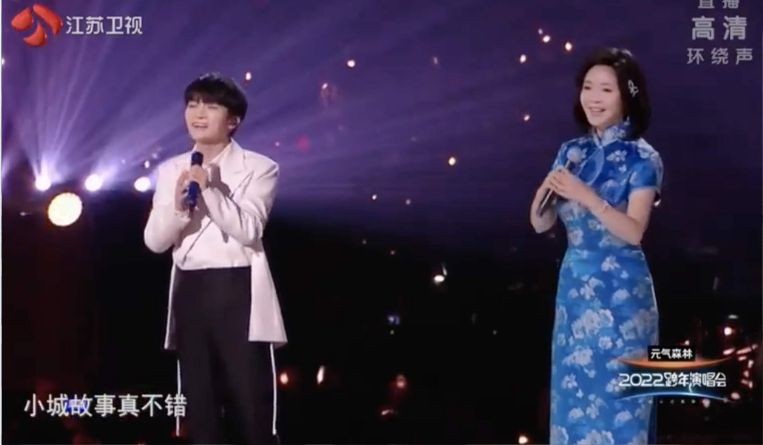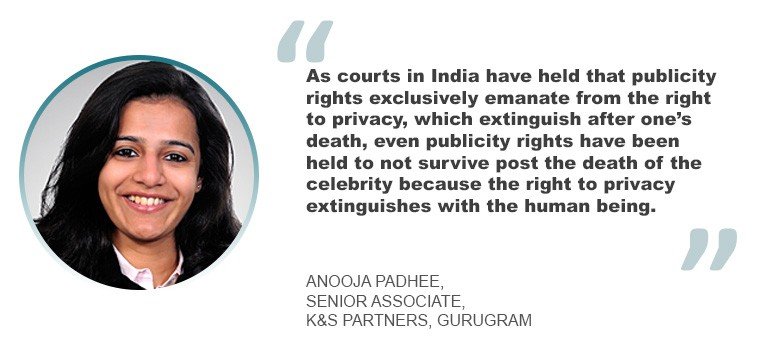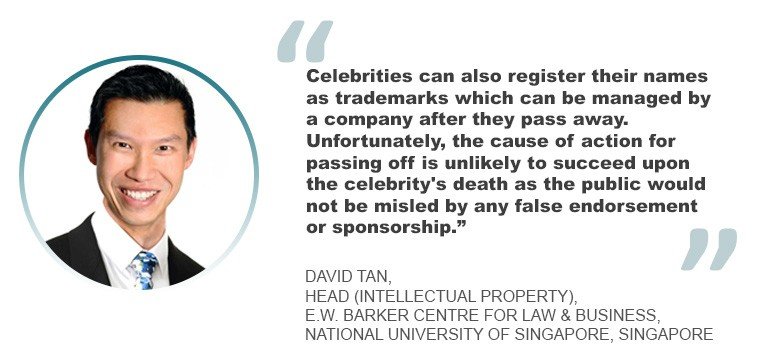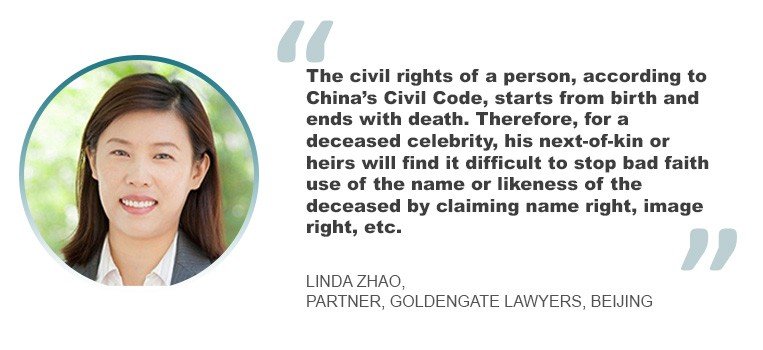Linda Zhao, a partner at GoldenGate Lawyers in Beijing, explained that while publicity right in China is not a certain statutory right, it does not mean there is no protection of publicity right in China. “In fact, you will find that different aspects of publicity rights are primarily covered in separate clauses under Civil Code, including individual’s name such as alias, stage name, short name, pen name, image, likeness and sound. Other laws may involve publicity right as well, such as the trademark law, which prohibits bad faith registration of celebrities’ names.”
Similar to cases in India and Singapore, there are limitations to the protection of the celebrity’s publicity rights after they passes away, Zhao said. “The civil rights of a person, according to China’s Civil Code, starts from birth and ends with death. Therefore, for a deceased celebrity, his next-of-kin or heirs will find it difficult to stop bad faith use of the name or likeness of the deceased by claiming name right, image right and etc.”
Nonetheless, this does not mean that one can abuse the name, likeness of a celebrity after his or her death, Zhao says. “Xiuqin Chen v. Xilin Wei & Tonight News in 1989 is the first case that draws attention to the publicity rights of the dead. In 2001, the Supreme Court issued an Interpretation of the Supreme People’s Court on Certain Issues concerning Determination of Liability for Compensation for Spiritual Damage Arising from Civil Torts, specifying in Article 3 that the next-of-kin of a deceased may claim compensation for mental distress caused by infringement of the name, likeness and etc., of the deceased by insulting, libelling, disparaging, vilifying, or by any other means contrary to the social public interests or social morality. Thereafter, Article 994 of Civil Code provides that where the name, likeness and etc. of a deceased is infringed, his or her spouse, children and parent have a right to request the infringer to assume liability, and where the deceased has no spouse, children and its parents are dead, other next-of-kins of the deceased has right to request the infringer to assume liability.”
Zhao also mentioned other laws in China that protect publicity rights in a certain degree. “Unauthorized use of the name (including penname, stage name and so on) of a celebrity to cause confusion among consumers is not allowed by Anti-unfair Competition Law. Advertising Law prohibits unauthorized use of the image or likeness of a celebrity for advertising.”
Zhao explained that in China, although the right concerning personality of a celebrity ceases at their death, the commercial benefits thereof still exist and can be inheritable to the deceased celebrity’s heirs. “For example, in the case Luca Dotti v. Jinhaihua Restaurant Management Company, the Suzhou High People’s Court ruled that an owner of his or her likeness and name has both spiritual and economic benefits, which benefits will not die with the death of the owner, but can be enjoyed by his or her heirs within a certain period of time, so Luca Dotti, the son of Audrey Hepburn, can ask Jinhaihua to assume liability for using his late mother’s name and photographs to exploit commercial benefits without consent.”
Zhao suggested how heirs of deceased celebrities should secure their interests. “Heirs may closely monitor unauthorized use of the deceased’s publicity rights and take proper actions when necessary. Their heirs may ask the infringer to stop committing the infringement, make apologies, or even make compensations for any damages arising out of the infringement. Generally speaking, the more famous the decreased celebrity is, the more compensation it is likely to claim. Of course, it is always advisable to preserve evidence of the unauthorized use of the publicity right, by means of notarization or timestamp, before taking any actions.”
If businesses would like to make use of a deceased celebrity’s likeness for commercial purposes, there are some points they should take note of, especially if the celebrity was resident in the United States. Tan said: “In some U.S. state jurisdictions, such as California, there is a post-mortem right of publicity protection, but there are also artistic use exemptions. Businesses need to check carefully the laws of the specific U.S. state or the country in which the deceased celebrity was resident in order to discern whether there is still post-mortem protection. Rights of publicity vary from state to state in the U.S., and although most states recognize the right during a person’s lifetime, only a few states extend those protections after death though. In California, for example, individuals have a posthumous publicity right, which can be bequeathed, while in New York, the right of publicity is extinguished at death.”
Zhao notes that in 2012, there was a legal dispute regarding whether Marilyn Monroe’s right of publicity survived her death. “It would, if she was a resident of California where she died, but it would not if she was a resident of New York where she owned a home. In the end, the court ruled that her name and image belonged to the public domain after her death,” Zhao said.
For Asian jurisdictions, where there is less comprehensive protection of publicity rights than the United States, businesses also need to take special care when making use of a deceased celebrity’s likeness. Padhee said: “While posthumous publicity rights have not yet been recognised in India, the jurisprudence in this regard is still evolving. As such, businesses should act responsibly and not exploit the publicity of rights of deceased celebrities in the absence of any express prohibition. The businesses should, as a matter of caution and good practice, be respectful of the celebrity and their families’ rights, and seek appropriate permission for use of the celebrity’s publicity rights post their death.”
“However, there is no prohibition on the use of information that is freely available in the public domain and no permission is required for appropriation of such material. For instance, businesses may show fictionalized accounts of incidents about the celebrity that are derived from information that is available freely in the public domain, along with a disclaimer that the depiction is based on real life events but is fictional.”



-content_original.jpg)







